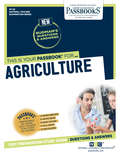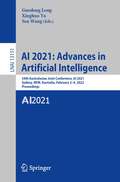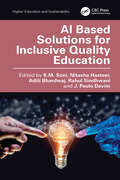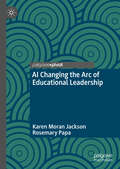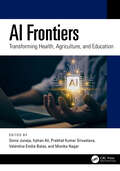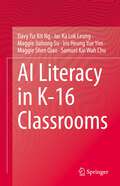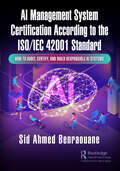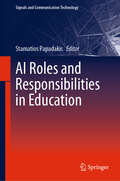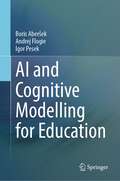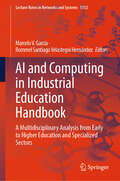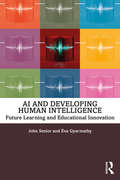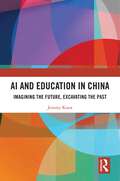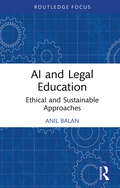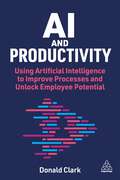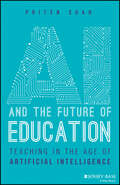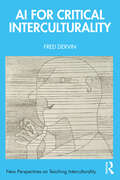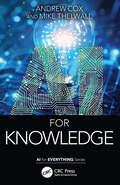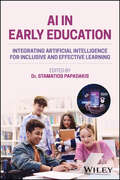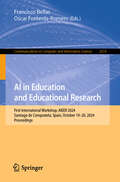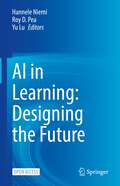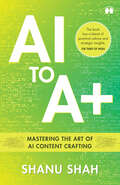- Table View
- List View
AGRICULTURE: Passbooks Study Guide (National Teacher Examination Series (NTE) #Nt-20)
by National Learning CorporationThe National Teacher/PRAXIS Examinations are designed to provide objective measurement of the knowledge, skills and abilities required of teachers. The Passbook® for the Agriculture exam provides hundreds of multiple-choice questions in the areas that will likely be covered on your upcoming certification test.
AGS United States History
by Wayne E. King John L. NappThis book is a story about the United States. As you read the units, chapters and lessons of this book, you will learn about the important people and events that shaped United States history.
AGS United States History
by Wayne E. King John L. Napp*This textbook has been transcribed in UEB, formatted according to Braille textbook formats, proofread and corrected. <P><P>This book is a story about the United States. As you read the units, chapters and lessons of this book, you will learn about the important people and events that shaped United States history.
AGS United States History
by John Napp Wayne KingWelcome to a study of United States history. You may be asking yourself, "Why do I need to know about people, places, and events that happened a long time before I was even born?" When we study the past, we can have a better understanding of why some things happened the way they did. We can learn from the mistakes and the successes of the past. This book is a story of the United States.
AI
by Barbara W. MakarA systematic, phonics-based early reading program that includes: the most practice for every skill, decodable readers for every skill, and reinforcement materials--help struggling students succeed in the regular classroom
AI 2021: 34th Australasian Joint Conference, AI 2021, Sydney, NSW, Australia, February 2–4, 2022, Proceedings (Lecture Notes in Computer Science #13151)
by Xinghuo Yu Sen Wang Guodong LongThis book constitutes the proceedings of the 34th Australasian Joint Conference on Artificial Intelligence, AI 2021, held in Sydney, NSW, Australia, in February 2022.* The 64 full papers presented in this volume were carefully reviewed and selected from 120 submissions. The papers were organized in topical sections named: Ethical AI, Applications, Classical AI, Computer Vision and Machine Learning, Natural Language Processing and Data Mining, and Network Analysis. *The conference was postponed from December 2021 to February 2022 and held virtually due to the COVID-19 pandemic.
AI Based Solutions for Inclusive Quality Education (Higher Education and Sustainability)
by J. Paulo Davim Rahul Sindhwani Nitasha Hasteer Aditi Bhardwaj K. M. SoniAI Based Solutions for Inclusive Quality Education helps readers discover practical AI tools for diverse learning styles and abilities, fostering inclusivity in education and maximizing the individual potential of students and educators. It provides cutting-edge solutions designed to remove barriers due to accessibility and create an equitable classroom. Through practical applications and case studies, the book explores the power of AI in creating personalized learning pathways and methods of engagement in the classroom while emphasizing that the human touch, with empathy and critical thinking, remains central to the learning process. It addresses concerns about the ethical development and deployment of AI in education.Features Discusses a topic that is at the forefront of concerns in the education sector with the disruptive impact of advances in AI. Provides explanations for specific AI platforms and tools, along with their features and applications in education. Includes case studies and discusses inclusivity and the lessons learned from each AI application. Explains how to ethically handle bias, privacy and transparency in AI-based solutions in education. Serves as a comprehensive guide for educators, policymakers and technology developers interested in the power of AI in educational environments. This book serves as a timely reference in the current era of AI tools and education. It is written for those who work in the education sector, as well as researchers, academicians, undergraduate and graduate students, those involved with undergraduate teaching in critical thinking and problem-solving for information systems, information technology, computer science and engineering and all teaching institutions where AI tools have been or will be introduced.
AI Changing the Arc of Educational Leadership
by Rosemary Papa Karen Moran JacksonAs artificial intelligence becomes an all-encompassing issue in education and beyond, this book seeks to answer how it will change the arc of educational leadership in K-12 schooling. Educators and leaders serve as the champions and gatekeepers of technology use in schools. They need to consider how AI can change education for the better while keeping in mind cultural, social, and emotional concerns that cannot be isolated from educational settings. Jackson and Papa examine existing literature and include insightful interviews with professionals in AI and education to understand how educators currently perceive and use AI. They also illustrate the similarities and differences in how educators and A.I.ED developers envision AI's present and future.
AI Frontiers: Transforming Health, Agriculture, and Education
by Valentina Emilia Balas Prabhat Kumar Srivastava Sonia Juneja Irphan Ali Monika NagarThe rapid advancement of artificial intelligence (AI) is revolutionizing key sectors critical to global progress. AI Frontiers: Transforming Health, Agriculture, and Education delves into how cutting-edge AI innovations are addressing some of the world’s most pressing challenges. This comprehensive volume explores the transformative impact of AI across healthcare, agriculture, and industrial landscapes, offering insights into practical applications, emerging trends, and future opportunities. By blending theoretical foundations with real-world case studies, this book empowers readers with actionable knowledge to leverage AI effectively.What sets this book apart is its interdisciplinary approach, combining technical depth with sector-specific insights. It goes beyond the basics to highlight ethical considerations, data governance frameworks, and sustainable development initiatives. Each chapter presents a roadmap for integrating AI solutions to enhance productivity, efficiency, and decision-making in diverse industries.Key Features: In-depth exploration of AI’s role in healthcare, from predictive analytics in diagnostics to AI-driven drug discovery and personalized treatment strategies. Detailed insights into AI applications in agriculture, including precision farming, crop disease prediction, and resource optimization. Coverage of industrial innovations powered by AI, such as predictive maintenance, process automation, and quality control systems. Case studies illustrating successful AI implementations in real-world scenarios. Discussion of ethical AI deployment, data privacy challenges, and strategies to bridge the digital divide. Forward-looking perspectives on AI’s role in advancing the United Nations’ Sustainable Development Goals (SDGs). This book is an essential resource for researchers, industry professionals, policymakers, and students seeking to understand the transformative power of AI. Whether you are a tech enthusiast, academic, or decision-maker, AI Frontiers offers valuable insights to help you navigate the rapidly evolving landscape of AI-driven innovation.
AI Literacy in K-16 Classrooms
by Samuel Kai Chu Davy Tsz Ng Jac Ka Leung Maggie Jiahong Su Iris Heung Yim Maggie Shen QiaoArtificial Intelligence is at the top of the agenda for education leaders, scientists, technologists and policy makers in educating the next generation across the globe. Beyond applying AI in daily life applications and educational tools, understanding how to learn and teach AI is increasingly important. Despite these emerging technology breakthroughs, AI learning is still new to educators especially to K-16 teachers. There is a lack of evidence-based studies that inform them about AI learning, including design principles for building a set of curriculum content, and pedagogical approaches as well as technological tools. Teaching AI concepts and techniques from programming languages and developmentally appropriate learning tools (e.g., robotics, serious games, software, intelligent agents) across different education levels emerged in recent years. The primary purpose of this book is to respond to the need to conceptualize the emerging term “AI literacy” and investigate how to teach and learn AI in K-16 education settings.This book examines different aspects of learning artefacts, pedagogies, content knowledge and assessment methods of AI literacy education, from theoretical discussions to practical recommendations for curriculum and instructional design. An exhaustive summary of current evidence with examples is illustrated in this book, as well as cutting-edge research that serves as an AI literacy model for different countries’ contexts. Part I, “Conceptualizing AI literacy”, provides a detailed discussion on the development of the concepts and frameworks on AI literacy education, discusses the differences and similarities between AI in education (AIED) and AI literacy education, and illustrates the reasons why K-16 students need to learn AI. These concepts are brought together in Part II, “K-16 AI literacy education” to further summarize the pedagogies, learning content, learning tools and assessment methods to inform K-16 educators how to design their AI instruction at each education level. After that, part III “AI literacy for instructional designers” explores how instructional designers (i.e., AI developers and teachers) prepare themselves to become ready to design developmentally appropriate tools, platforms, services and curricula to empower students with AI literacy skills.
AI Management System Certification According to the ISO/IEC 42001 Standard: How to Audit, Certify, and Build Responsible AI Systems
by Sid Ahmed BenraouaneThe book guides the reader through the auditing and compliance process of the newly released ISO Artificial Intelligence standard. It provides tools and best practices on how to put together an AI management system that is certifiable and sheds light on ethical and legal challenges business leaders struggle with to make their AI system comply with existing laws and regulations, and the ethical framework of the organization.The book is unique because it provides implementation guidance on the new certification and conformity assessment process required by the new ISO Standard on Artificial Intelligence (ISO 42001:2023 Artificial Intelligence Management System) published by ISO in August 2023. This is the first book that addresses this issue.As a member of the US/ISO team who participated in the drafting of this standard during the last 3 years, the author has direct knowledge and insights that are critical to the implementation of the standard. He explains the context of how to interpret ISO clauses, gives examples and guidelines, and provides best practices that help compliance managers and senior leadership understand how to put together the AI compliance system to certify their AI system. The reader will find in the book a complete guide to the certification process of AI systems and the conformity assessment required by the standard. It also provides guidance on how to read the new EU AI Act and some of the U.S. legislations, such as NYC Local Law 144, enacted in July 2023.This is the first book that helps the reader create an internal auditing program that enhances the company’s AI compliance framework. Generative AI has taken the world by storm, and currently, there is no international standard that provides guidance on how to put together a management system that helps business leaders address issues of AI governance, AI structure, AI risk, AI audit, and AI impact analysis. ISO/IEC 42001:2023 is the first international mandatory and certifiable standard that provides a comprehensive and well-integrated framework for the issue of AI governance. This book provides a step-by-step process on how to implement the standard so the AI system can pass the ISO accreditation process.
AI Roles and Responsibilities in Education (Signals and Communication Technology)
by Stamatios PapadakisThis book explores how artificial intelligence (AI) is reshaping education through practical, pedagogical, and ethical lenses. It provides educators, policymakers, and researchers with evidence-based strategies for integrating AI tools into teaching and learning, particularly within STEAM education. Drawing from real-world implementations, including an in-depth case study of postgraduate teacher training in Europe, the author presents AI not merely as a tool but as a catalyst for educational transformation. Topics include generative AI, curriculum design, ethical integration, and responsible innovation. From adaptive tutoring systems to prompt engineering, the book equips readers with the knowledge and frameworks needed to critically and creatively engage with AI in classrooms. Demonstrates classroom-tested strategies for AI use in STEAM and broader educational contexts; Highlights ethical challenges, including algorithmic bias, transparency, and human oversight; Offers a future-oriented framework for AI literacy and curriculum integration.
AI and Cognitive Modelling for Education
by Boris Aberšek Andrej Flogie Igor PesekThis book offers a groundbreaking approach to bridging the gap between various disciplines involved in cognitive modeling in education. By drawing on the fields of learning, neuro science, cognitive science, neurobiology, and computer science, it provides a new perspective on how we can integrate these disciplines with education to create more effective learning environments. The main objective of this book is to delve into the ethical, sociological, and technological questions surrounding the introduction of intelligent and smart learning environments in education. By analyzing these issues, this book aims to bridge the gap between the various disciplines involved in cognitive modeling and education, while highlighting the benefits and risks associated with these advancements. With the emergence of AI-based tutors, coaches, and learning environments, students now have access to a new type of self-learning and self-training that was previously unavailable. Distance learning has become increasingly popular in recent years, and the use of computer-assisted learning tools has revolutionized the way we think about education. The goal of education must be to instill in students a desire to learn for themselves, and this can only be achieved through active, self-directed, and reflective learning. With intelligent tutoring systems, students are empowered to take an active role in their own education, rather than simply being passive recipients of information. This book offers practical strategies for teachers to facilitate this transition, enabling them to act as facilitators and guides rather than one-way communicators. By embracing this new approach to education, we can help students become lifelong learners who are equipped with the skills they need to succeed in the 21st century. As we cannot predict the future with certainty, the true effects of education may only be revealed in the long run, making it critical to understand the potential consequences of introducing these new learning tools. By exploring these complex topics, this book offers valuable insights for educators, policymakers, and anyone interested in the future of education.
AI and Computing in Industrial Education Handbook: A Multidisciplinary Analysis from Early to Higher Education and Specialized Sectors (Lecture Notes in Networks and Systems #1512)
by Marcelo V. Garcia Rommel Santiago Velastegui HernándezThis book bridges Industry 4.0 principles with educational innovation, offering groundbreaking approaches that transform learning environments across diverse contexts. Readers discover practical applications ranging from AI-powered diagnostics to gamification strategies, all designed to make education more accessible, engaging, and effective.The unique collaboration between Hispanic American and European researchers brings fresh perspectives to educational technology, organizing cutting-edge research into six comprehensive sections. What distinguishes this work is its human-centered approach—each technological advancement connects directly to pedagogical improvement.Educators, researchers, and technology specialists find value in the book&’s exploration of solutions like holographic displays, 3D-printed prosthetics for STEM education, and psychological self-assessment platforms. Beyond serving as a reference, this book establishes a foundation for continued cross-cultural dialogue and future innovation, helping institutions integrate emerging technologies while keeping human development at the core of educational transformation.
AI and Developing Human Intelligence: Future Learning and Educational Innovation
by John Senior Éva GyarmathyAs the relationship between AI machines and humans develops, we ask what it will mean to be an intelligent learner in an emerging, socio-dynamic learningscape. The need for a new global view of intelligence and education is the core discussion of this future-focussed collection of ideas, questions, and activities for learners to explore. This fascinating guide offers activities to understand what needs to be changed in our educations systems and our view of intelligence. As well as exploring AI, HI, the future of learning and caring for all learners, this book addresses fundamental questions such as: How do we educate ourselves for an increasingly uncertain future? What is the purpose of intelligence? How can a curriculum focussing on human curiosity and creativity be created? Who are we and what are we becoming? What will we invent now that AI exists? AI and Developing Human Intelligence will interest you, inform you, and empower your understanding of "intelligence" and where we are going on the next part of our journey in understanding what it is to be human now and tomorrow.
AI and Education in China: Imagining the Future, Excavating the Past
by Jeremy KnoxThis book explores the relationships between artificial intelligence (AI) and education in China. It examines educational activity in the context of profound technological interventions, far-reaching national policy, and multifaceted cultural settings. By standing at the intersection of three foundational topics – AI and the recent proliferation of data-driven technologies; education, the most foundational of our social institutions in terms of actively shaping societies and individuals; and, finally, China, which is a frequent subject for dramatic media reports about both technology and education – this book offers an insightful view of the contexts that underpin the use of AI in education, and promotes a more in-depth understanding of China. Scholars of educational technology and digital education will find this book an indispensable guide to the ways new technologies are imagined to transform the future, while being firmly grounded in the past.
AI and Legal Education: Ethical and Sustainable Approaches (Routledge Research in the Law of Emerging Technologies)
by Anil BalanThis book provides a comprehensive interdisciplinary analysis of the sustainable and ethical integration of artificial intelligence (AI) within legal education, offering practical strategies for balancing innovation with ethical responsibility. Discussing the intersection of legal studies, technology and ethics, the book focuses on AI's role in reshaping professional education.With the rising demand for digital transformation in legal education and the increasing scrutiny of AI's ethical impact, this book explores the potential of AI to enhance legal learning and practice, while critically examining the challenges of data privacy, algorithmic bias and equitable access to technology. Outlining a framework for incorporating AI into the law curriculum, the book equips the readers with both cutting-edge technological skills and a deep understanding of AI’s ethical and societal implications. Drawing on a wide range of sources, including industry data and academic research, the book offers grounded, actionable guidance on implementing AI in a way that promotes inclusivity, sustainability and long-term relevance. It addresses the needs of legal education institutions, faculty and students, providing them with the tools to navigate the evolving legal landscape while maintaining ethical standards.The book will also be of interest to researchers in the fields of law, education and AI ethics.
AI and Productivity: Using Artificial Intelligence to Improve Processes and Unlock Potential
by Donald ClarkIs AI in your organization driving real productivity or creating costly distractions? AI and Productivity by Donald Clark is a strategic guide for senior leaders and people executives who want to harness artificial intelligence to improve efficiency, strengthen workforce capability and protect long-term business performance.Written by a leading industry voice, this book provides proven tools for assessing where AI genuinely adds value, and where it risks undermining skills, curiosity and critical thinking. It addresses the unstructured, rapid adoption of AI, offering governance-led approaches to integrate it effectively across recruitment, HR and Learning and Development. You'll discover how to: - Identify high-impact AI applications that align with strategic objectives - Avoid productivity loss from poorly targeted AI implementation - Safeguard employee learning, problem-solving and communication skills - Balance efficiency gains with talent development and cultural health With real-world insights and practical frameworks, AI and Productivity equips senior decision-makers to ensure AI adoption delivers measurable results while sustaining the human capabilities essential for future success.Themes include: AI strategy, governance, workforce capability, productivity, talent development
AI and the Future of Education: Teaching in the Age of Artificial Intelligence
by Priten ShahClear away the fog surrounding AI in education—and regain your peace of mind Among teachers, there is a cloud of rumors, confusion, and fear surrounding the rise of artificial intelligence. AI and the Future of Education is a timely response to this general state of panic, showing you that AI is a tool to leverage, not a threat to teaching and learning. By understanding what AI is, what it does, and how it can be used to enhance education, you can let go of anxiety and uncertainty, and learn to embrace artificial intelligence. It's true that, along with tremendous opportunities, AI presents some challenges for the field of education. In this book, Priten Shah, a Harvard M.Ed. with a robust background in educational innovation, helps you face these challenges head on, so you can gain the knowledge and skills you need to use AI effectively in your classroom. Thanks to this thorough consideration of ethical considerations and practical approaches, you can develop your own strategy for leveraging AI in administrative tasks, lesson design, professional development, and beyond. Understand what AI and machine learning are, and learn about new developments like ChatGPT Discover strategies for engaging students more fully using AI Automate administrative tasks, grading and feedback, and assessments Use AI in innovative ways to promote higher-order thinking skills Examine ethical considerations of AI, including the achievement gap, privacy concerns, and bias For K-12 educators, as well as leaders and policymakers who want to understand the role of technology in education, AI and the Future of Education is a valuable resource that can change AI from an unknown entity to an indispensable tool.
AI for Critical Interculturality (New Perspectives on Teaching Interculturality)
by Fred DervinProvocative, interdisciplinary, and daringly critical, AI for Critical Interculturality doesn’t spoon-feed ready-made answers but rather inspires readers to think, question and interrogate interculturality alongside AI. In a world where AI is often feared as a threat to human intelligence and creativity, the book flips the script by positioning AI as a valuable partner in the study of interculturality as both a scientific and educational notion. How could AI help us dismantle biases, interrogate knowledge production/dissemination and foster deeper self-reflexivity in the broad field of Intercultural Communication Education and Research? What happens when we treat AI not as a passive tool but as an active interlocutor – one that mirrors our ideological blind spots and pushes us toward sharper criticality and reflexivity? Through rich theoretical and conceptual insights, real-world cases and interactive activities, this book equips readers to unmask ideologies in AI-generated knowledge about interculturality; leverage AI as a mirror to expose and confront personal and systemic biases; consider some language stratagems to disrupt linguistic norms in human-AI dialogue. More importantly, the author asks us to forge an ethical and non-utilitarian partnership with AI. This boundary-shattering work invites students, educators and researchers of interculturality to envision and co-create the future of intercultural studies.
AI for Knowledge (AI for Everything)
by Mike Thelwall Andrew CoxAI for Knowledge explores the question of whether artificial intelligence (AI) is transforming knowledge access and creation for the good. AI is accelerating our access to knowledge through search, recommendation, summarisation, translation and a proliferating range of tools with AI built in. Generative AI is further changing how we use and create information at home and in the workplace. Yet AI also has a dark side with hallucination, bias and lack of explainability, as well as potential for harmful impacts on social equity and the environment.The book investigates how AI will impact everyday knowledge discovery, understanding and creation. It considers both the positive benefits and the many informational and ethical challenges, including the impact on our wider information culture. It then weighs up the impact on scholarship, in science, social science and the humanities and including the processes of scholarly communication. It explains the role of libraries and archives and how they could be enhanced using AI. It concludes by showing how governments can regulate AI to ensure social benefit and outlines what we as individuals need to know about AI.The book helps the reader see through some of the AI hype to understand much more clearly what are the issues around the impact of AI on knowledge access and creation, including the implications for environmental sustainability and the power of Big Tech. What emerges is a nuanced picture of potential benefit and risk, especially when we consider the experiences of those with less privileged access to the digital, particularly those outside the Global North.
AI in Early Education: Integrating Artificial Intelligence for Inclusive and Effective Learning
by Stamatios PapadakisAn original and up-to-date examination of how to use AI to improve pre-school and early childhood education In AI in Early Education: Integrating Artificial Intelligence for Inclusive and Effective Learning, examines how to use artificial intelligence technology to enhance teaching and learning with personalized learning pathways, inclusive instructional practices, and increased student engagement. The book explores key themes, like AI literacy for young learners, ethical and pedagogical considerations, and the professional development that educators need to effectively integrate these tools into their classrooms. You'll also find: Ways to use AI to support diverse learners, including those with special educational needs Hands-on strategies that offer educators clear, practical ways to bring AI tools into the classroom A careful emphasis on inclusion strategies, demonstrating how AI can help tailor learning experiences to meet the needs of all students Perfect for educators, teacher trainers, researchers, regulators, and policymakers interested in how artificial intelligence might contribute to the improvement of early childhood and primary education, AI in Early Education is also a must-read for pre-service and in-service teachers and professionals involved in curriculum development and inclusive education.
AI in Education and Educational Research: First International Workshop, AIEER 2024, Santiago de Compostela, Spain, October 19–20, 2024 Proceedings (Communications in Computer and Information Science #2519)
by Oscar Fontenla-Romero Francisco BellasThis book constitutes the proceedings of the First International Workshop on AI in Education and Educational Research, AIEER 2024, held in Santiago de Compostela, Spain, during October 19–20, 2024. The 16 full papers presented in this volumes were carefully reviewed and selected from 23 submissions. They focus on various aspects on AI applications in educational settings, particularly emphasizing the integration of Large Language Models (LLMs) and explainable AI (XAI).
AI in Learning: Designing the Future
by Hannele Niemi Yu Lu Roy D. PeaAI (Artificial Intelligence) is predicted to radically change teaching and learning in both schools and industry causing radical disruption of work. AI can support well-being initiatives and lifelong learning but educational institutions and companies need to take the changing technology into account. Moving towards AI supported by digital tools requires a dramatic shift in the concept of learning, expertise and the businesses built off of it. Based on the latest research on AI and how it is changing learning and education, this book will focus on the enormous opportunities to expand educational settings with AI for learning in and beyond the traditional classroom. This open access book also introduces ethical challenges related to learning and education, while connecting human learning and machine learning. This book will be of use to a variety of readers, including researchers, AI users, companies and policy makers.
AI to A+
by Shanu ShahUnlock the true power of your AI-generated content with AI to A+. Packed with practical strategies and proven techniques, this book equips you with the tools to elevate your writing to new heights. Each chapter presents a carefully crafted rubric designed to transform your drafts into polished, compelling narratives.Whether you are a seasoned content creator or just beginning to explore the world of generative AI, this guide offers actionable insights to make your work stand out. With a handy checklist and key takeaways included, applying these principles becomes a seamless part of your writing routine.More than just a manual, AI to A+ is your strategic partner in mastering the art of AI content editing. So, start your journey towards content excellence today and discover how to make every word count.
